- Home
- Barbara Kingsolver
Flight Behavior Page 27
Flight Behavior Read online
Page 27
Cub seemed to consider this. "What else can they do, though?"
"They could talk to Dr. Byron. He's out here twenty-four/seven, looking at all the angles, trying to figure out what's going on." She felt the squeeze of her heart and the race of pulse when she said his name, like a doctor observing a patient. She was surprised to realize she had no intention of running from this, or quitting her job. She had to be part of this story. She would die of him or be cured.
They walked on, she and Cub together studying the fence for need of further mending. From this high part of the pasture they could see in all directions through the barren woodlands. The topography of the farm came clear: the steep, high reach of mountains behind, the narrow drainage of the valley below. It occurred to her how much was obscured in summer by the leaves. With all those reassuring walls of green, a person could not see to the end of anything. Summer was the season of denial.
At the upper east corner of the field they began to make their way down along the property line between their pasture and the Cooks' dead orchard. The skeletal peach trees in their rows leaned into the slope with branches upstretched like begging hands. Casualties of this strange weather. The window in Preston and Cordie's room looked out on these trees, and for a while she'd kept the curtains drawn, it was so depressing. But here they stood anyway. Someone at church had said the Cooks were now in Nashville for the duration of some further treatment, bone marrow or something, probably torturous. That poor child. Poorer still, the parents.
"I was thinking that," Cub said, after a long interval. "What you said about talking to the doctor. Jack Stell and them ought to ask him about the butterflies. But maybe he wouldn't tell them what they want to hear."
"People do manage to cope with bad news," she replied. But it was true, no one in town wanted Dr. Byron's counsel. She'd tried to send newspeople his way, but they didn't bite. The high school teachers hadn't thrown out the welcome mat either. She thought of how Bobby Ogle moved people, persuading them with his demeanor, so loving and forthright. Whatever he said, you wanted it to be right for his sake. Ovid had that same air about him, for the most part he listened and did not judge. It made no sense that people would embrace the one and spurn the other.
"He's not from here, that's the thing," Cub said.
"Just because he's the outsider, he has no say? Should we not read books, then, or listen to anybody outside this county? Where's that going to leave us?"
Cub made no attempt to answer.
"Watching our grass grow, is where." She tried to tame the defensiveness in her tone, knowing this was not Cub's fault. People who'd never known the like of Ovid Byron would naturally mistrust him. They couldn't close out the whole world, maybe, but they could sure find something on their TV or radio to put scientists or foreigners or whatever they thought he was in a bad light. Truly, they were no better than the city people always looking down on southerners, with one Billy Ray Hatch or another forever at their disposal. If people played their channels right, they could be spared from disagreement for the length of their natural lives. Finally she got it. The need for so many channels.
"How do you like that, anyway?" Cub asked.
"Like what?"
"That job. Doing stuff out there in the barn. What do you do?"
She had assumed Cub was incurious and had never tried to explain her days, which were in any case inexplicable. As soon as we finish the lipids, I am going to put you on OE counts. This is interesting. Have a look. Never in her life had anyone spoken to her this way, and now someone had, and it made her a different sort of person. Someone she would like to keep on being.
"I see new things," she said simply. "I'm not actually in charge of anything. I'm kind of a glorified secretary."
"You type?" Cub asked, and she laughed. She could hardly think when she'd seen anyone use a typewriter, except secretaries on television. Maybe the ladies at the DMV, filling in some form for a driver's license.
"No, I write down numbers in a notebook. I keep track. That's really what Dr. Byron and Pete do, too. They measure different things and write it all down."
"I guess it's in knowing what to measure."
"You're right," she said. "That's what it is."
"Same in farming," he said, and she saw he was right about that too, it was astute. Someone on this farm had to check the inner eyelids of the ewes and lambs every week, watching for anemia by degrees as an indication of parasite load. They monitored the hayfield for the right proportion of seedhead to stem. They bred and culled the sheep based on meat yields and staple lengths of the fleece. Hester was the director of operations, and kept the best notes.
"It's more detailed, though," she said. "All this week I counted parasites in the microscope. And helped measure the amount of fat in a butterfly's body. They can measure a thousandth of a gram. A gram is, like, teeny. There's hundreds of them to a pound. In that lab they could weigh your eyelashes and lay them out in order of size."
Cub whistled.
"Not that they actually would," she said. "It's just an example."
"Why do you need to know how fat a butterfly is?" Cub asked.
"It's just knowing all there is to know about an animal. Like sheep, like you said. Little signs tell you a lot. He wants to know what's making the butterflies sick."
"They're sick?"
"They all came here for the winter, and they shouldn't have, because the winter's too cold here. But they came because of things being too warm. Or, I guess we don't know because of what. But he says it's something gone way wrong."
"Now see, I don't hold with that," Cub said. Exactly as she'd expected. Cub would not be disposed to this way of thinking, any more than the people in town or Tina Ultner and her national broadcast audience. All were holding out for the miracle angle. Honestly, it made a better story.
"Suit yourself," she said. They descended the slope, passing near enough to the Cooks' house to see lights on inside and a car in the drive, not the Cooks' farm truck but a white sedan. So someone was looking after the place for them. Dellarobia knew she ought to call the house and ask after the boy. It was so hard. What if he'd passed away?
They paused again to rip the wild, disorganized tangles of vines from the neat rectangles of woven wire. She couldn't even guess how many times they'd done this over the years, ever hopeful they could keep the stuff at bay. It was probably their chief project as a married couple, she thought: tearing honeysuckle out of a fence.
After a while Cub asked, "You're saying butterflies can go wrong in their heads?"
"No, it's not that. Other things go wrong, and they stay the same, so it confuses them. It's like if every Friday you drove to Food King, but then one Friday you did the same as always, followed the same road signs, but instead of Food King you wound up at the auto parts store. You'd know something was messed up. Not with you necessarily, but something out of whack in the whole town."
Cub appeared to take this in.
"So they're here by mistake," she said. "And they can't adjust to it. Dr. Byron said it's like if we got persuaded to come out here for some reason and live among the sheep. We still couldn't eat grass. And we wouldn't have baby sheep, we'd have babies, and they'd be in trouble with the freezing rain and the coyotes." She'd embellished Ovid's example, but felt it was valid.
"What persuaded the butterflies off their track?" Cub asked.
"Well, see, that's what they're wanting to figure out," she said. "And Dr. Byron's not the only one wondering. There's more to it than just these butterflies, a lot of things are messed up. He says it's due to climate change, basically."
"What's that?"
She hesitated. "Global warming."
Cub snorted. He kicked up a cloud of dusty frost. "Al Gore can come toast his buns on this." It was Johnny Midgeon's line on the radio, every time a winter storm came through.
"But what about all the rain we had last year? All those trees falling out of the ground, after they'd stood a hundred years. The weather's t
urned weird, Cub. Did you ever see a year like we've had?"
They arrived at the bottom of the field and turned along the road, the last lap before reaching the house and barn. A black pickup passed with a German shepherd standing in the bed. Finally Cub said, "They don't call it global weirding."
"I know. But I think that's actually the idea."
Cub shook his head. "Weather is the Lord's business."
She felt an exasperation that she knew would be of no use to this debate. She let it rise and fall inside her, along with wishful thoughts. Every loss she'd ever borne had been declared the Lord's business. A stillborn child, a father dead in his prime.
"So we just take what comes?" she asked. "People used to say the same thing whenever some disease came along and killed all the children. 'It's part of God's plan.' Now we give them vaccinations. Is that defying God?"
Cub made no reply.
"Here's the thing," she said. "Why would we believe Johnny Midgeon about something scientific, and not the scientists?"
"Johnny Midgeon gives the weather report," Cub maintained, and Dellarobia saw her life pass before her eyes, contained in the small enclosure of this logic. All knowledge measured, first and last, by one's allegiance to the teacher.
They made their way along the final stretch, approaching the compound of house and barn and Ovid's trailer, but the sight of home gave her no comfort. Sooner or later he would come out of that camper, they would speak, something would have to happen. Cub getting hurt, she couldn't abide, but damage seemed so inevitable. The sky was lower and darker than when they'd left the house an hour ago, and the air felt colder. On the north-facing slopes the ground was still frosted white. There had been talk of snow. Broad-leaved weeds growing along the ditch stood wilted on their stems like tattered flags of surrender. The short distance to their house was a gulf she dreaded to cross.
Cub made a small coughing sound, a kind of nervous preparation that caused her own throat to narrow like a drain. "We have to talk about something," he said.
Her face felt numb. "Okay, what."
"I don't know how to say it."
"Just say it, Cub."
"I can't."
It would be a kindness to help him, but she could not find words. Their unmatched footsteps made a strange, irregular percussion, their heels cracking the thin ice that rimed the mud along the ditch. Finally Cub said, "It's about Crystal."
Dellarobia felt her mind briefly slip its tracks. "What?"
He inhaled slowly. "Crystal Estep."
"I know who Crystal is, Cub. What about her?"
"She's been coming to the house."
"What do you mean, when?"
"When you're still over there working."
"What, she comes every day?"
"No, it's been four or five times. Always on the days when I was off from work--I don't know how she knows. When I'm there with the kids instead of Lupe. She always starts off saying she wants you to look at that letter again."
"Four or five times in two weeks? She can't remember I'm working now from nine to five? Seems like even Crystal Estep could get that one down."
Cub's anguish was visible. He shook his head, looked at the sky.
"Oh, Jesus, Cub. Did you guys--what are you telling me?"
"Nothing. We didn't do anything, Dellarobia. Believe me, she's not . . . She's Crystal. And anyway, with the kids right there, what do you think? I'm a married man."
She remembered Crystal in the dollar store before Christmas, leaning back against her cart, talking to Cub. That weirdly suggestive posture she had dismissed as the body language of habitual desperation. In some crucial way she had branded Crystal as a noncontender. Dellarobia felt dismayed by the abrupt reordering of her world, Cub's place in it, and her own. Absorbed in her own infatuations, so sure of herself as the fast horse in this race, she was last to know the joke was on her. A typical wife, blind as a bat, missing every sign as another woman angled for her husband. She would see Cub as quite the catch, would Crystal. He was a catch, ample and uncorrupted. A man whose assets were largely going to waste on the woman who'd landed him by accident.
"I would never cheat on you," Cub said, exhaling spasmodically, close to tears.
"I know you wouldn't, Cub. You're a good man. Better than I deserve."
"Don't say that," he said, running his thumb against the inside corners of both eyes. They had arrived at the gate between pasture and backyard. With effort she avoided looking at the shell-like casing of the trailer hunched between their house and the barn. Everything was close together here, the house and driveway crowded into a corner of the farm that had been carved out of the pasture, back when Bear and Hester built the house. Like the wedding and the house itself, it was a hurry-up kind of fence. They'd used metal T-posts and cheap wire that still looked provisional after these many years, like the afterthought it was. She'd always despised that webbed wire crossing the view from her bedroom window. But it was after all just a fence, whose full perimeter she had walked and repaired. The house stood outside of it, belonging instead to the open road frontage it faced. Cub lifted the gate, and she passed ahead of him into the yard, registering the small metallic knuckling of the chain he latched behind her.
Pete banged loudly at the kitchen door early Monday, startling Dellarobia and the kids, to let her know the work was up on the mountain that day. Dr. Byron was already there, Pete was headed up now, and she was to follow as soon as she was free. He asked her to bring pillowcases. After bafflement over the pillowcases, her first emotion was relief. It would be easier to face him up there than to walk into the lab with the weight of her spy's conscience. Dr. Byron in the woods would be intent on the butterflies and possibly up a tree. Only secondly did she think to worry on the butterflies' behalf. The sky had cleared overnight, and the gust of cold air that rushed in at the door's brief opening lingered unkindly in the kitchen. It must have been worry that sent the men up the mountain at this hour.
The kids were still in their pajamas, eating breakfast. Cordie had a cold that had kept her moody and congested for weeks, mouth-breathing like a bulldog. Dellarobia ached to turn up the heat, but, thinking of the electric bill, did not. Preston would catch the bus at seven forty-five, Cub would be dropping off Cordelia at Lupe's apartment on his way to work, and the house would stand empty all day. How she would get everyone dressed and ready in the next forty minutes was beyond comprehension, but somehow her lunch-packing, coffee-swilling gallop around the kitchen always got the job done.
Pillowcases? Did Pete mean she should bring pillows as well? There was no end to their ingenuity in applying household items to the cause of science, asking her for clothespins or coat hangers or kitchen sponges for their various contraptions. She had revised her notion of them as spendthrifts as she watched them improvise and make do. Even Gatorade had its use in the lab, as fuel for captive butterflies that had to be kept alive for some experiment. But pillows? She held at bay a vision of twisted bedsheets and Ovid Byron's body, though her mind pulled in that direction. She slammed the refrigerator door with her hip. Cordie's hair looked like a golden haystack, but the child was in a rare compliant state, shoveling in breakfast one-handed while keeping a grip on a plaid stuffed bear that dangled from her high chair tray in button-eyed desperation. That was Cordie; from birth she'd kept an eternal hold on something, a toy or blanket or any ponytail that swung into reach. Preston was more self-contained, maybe a boy thing.
Or just a Preston thing. Right now he was ignoring his cereal and poring over his sheep book, one of several Cub had borrowed from Hester to prepare them for possible lambing emergencies after they brought the ewes over. She wished Cub had chosen something more age-appropriate. Preston of course went for the giant veterinary manual filled with every imaginable thing that could go wrong in the barnyard. Poor little guy, he hefted this concrete block of a book from room to room and had asked to take it to school, provoking Cub's twin admonishments that he couldn't read, and that people would ca
ll him an egghead. Preston registered both as immaterial. He liked being the teeny guy with the big book. And pictures were abundant. He'd easily found the chapter on lambing. Its many line drawings of unborn twin lambs curled together with twined limbs, nose-to-nose or nose-to-tail, made her think of a sex manual.
Cordelia's attentive eye followed her brother's. "Goggies," she pronounced.
"It's not dogs," Preston corrected. "They're baby lambies."
Dellarobia sat down with a bowl of cottage cheese, her makeshift breakfast, and Preston looked up at her with his eyes full of questions. "Why are they taking a nap in a dog bed?" he asked.
She carefully did not laugh, and told him the oval shape was the womb. The pictures were supposed to show how the lambs looked inside the mother sheep. "They're still in her tummy waiting to be born, like when Cordie was in mine. Remember that?"
He nodded gravely. They both looked at Cordelia, her face spackled with cream of wheat and her runny nose. Probably they were thinking variations of the same question: Who knew this was coming?
"Don't forget to eat, big guy. Two more minutes and you've got to run and get dressed. The school bus waits for no man."
He spooned in Cheerios absently while leaning into the text, his interest redoubled by the latest revelation. His earnest expression and level brow moved Dellarobia to a second sight: Preston would go far. Maybe he'd be a vet, farmers were crying for them around here. Or even the kind of vet that looks after elephants in zoos. For all her worry about his lack of advantages, Preston would be like Ovid Byron. Already he seemed set apart by a devotion to his own pursuits that was brave and unconforming. People were so rarely like that, despite universally stated intentions. Most were like herself and Dovey, the one-time rebel girls with their big plans to fly out of here. Her boldness had been confined to such tiny quarters, it counted for about as much as mouse turds in a cookie jar. Until recently, when the lid blew off, and the whole world could peer in at Dellarobia, and what do you know, she was a mouse. But here sat her lionhearted son. Maybe it wasn't a decision, but something drawn from the soup of birth. A lightning strike.
"Mama, what's this man doing?" he asked, sounding anxious.

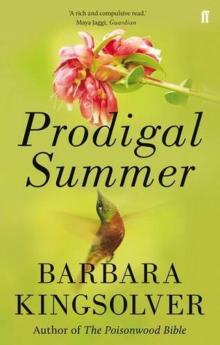 Prodigal Summer: A Novel
Prodigal Summer: A Novel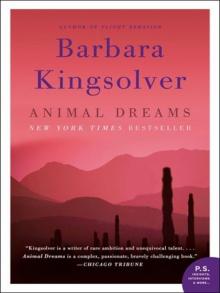 Animal Dreams: A Novel
Animal Dreams: A Novel The Poisonwood Bible
The Poisonwood Bible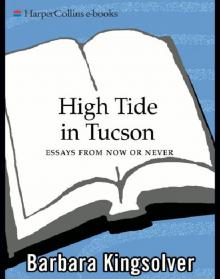 High Tide in Tucson
High Tide in Tucson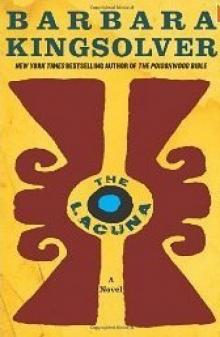 The Lacuna
The Lacuna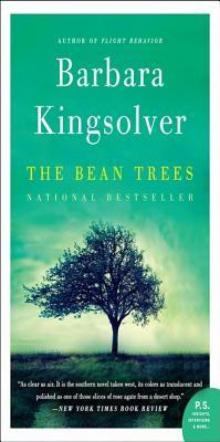 The Bean Trees
The Bean Trees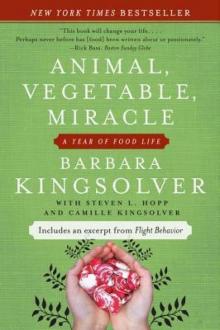 Animal, Vegetable, Miracle: A Year of Food Life
Animal, Vegetable, Miracle: A Year of Food Life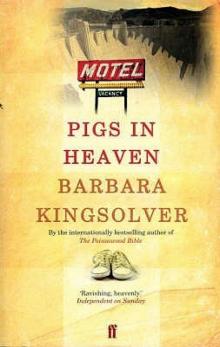 Pigs in Heaven
Pigs in Heaven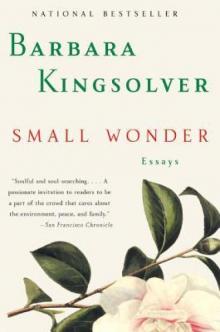 Small Wonder
Small Wonder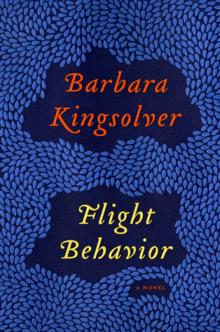 Flight Behavior
Flight Behavior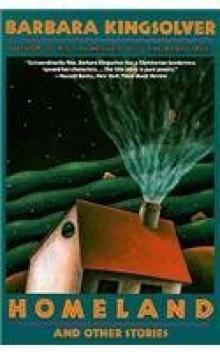 Homeland and Other Stories
Homeland and Other Stories How to Fly (In Ten Thousand Easy Lessons)
How to Fly (In Ten Thousand Easy Lessons) Unsheltered
Unsheltered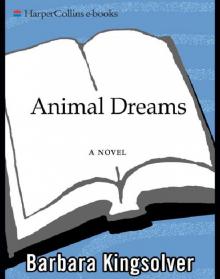 Animal Dreams
Animal Dreams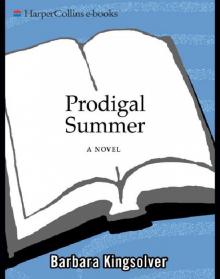 Prodigal Summer
Prodigal Summer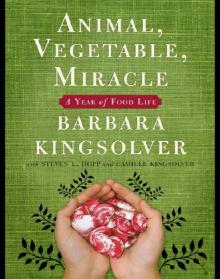 Animal, Vegetable, Miracle
Animal, Vegetable, Miracle